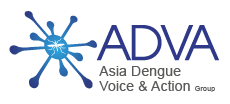Dengue is a major health issue in Asia, which accounts for around 75% of the global disease burden, costing the Southeast Asian region an estimated $1 billion annually, according to the World Health Organization.
1.8 billion of the 2.5 billion people at risk globally are in Asia. Indonesia and Vietnam reported the second- and third-highest number of cases among the 30 most endemic countries worldwide. Thailand had its worst epidemic in more than two decades in 2013, with 150,454 reported cases and 133 fatalities, although there was a sharp decline last year. Incidence varies with the effect of environmental factors on the mosquito vector, and although mosquito control is seen as a key complementary strategy to a vaccine, by itself it has not been broadly successful in curbing the disease. The WHO is looking to reduce global dengue mortality by 50% and morbidity by 25% by 2020.
Set up in 2011, ADVA’s mission is to identify opportunities and make practical recommendations for improving surveillance and laboratory capacity for dengue disease confirmation, including:
- documenting and standardising existing systems and coverage
- standardising case confirmation and diagnostics
- selecting initial target groups for vaccination
- addressing programme feasibility by improving existing infrastructure (cold chain, pharmacovigilance, vaccination compliance monitoring, and vaccine supply and distribution logistics)
- preparing and implementing a risk management plan
- collaborating with other relevant dengue initiatives including V2V (vaccine to vaccination) and the Dengue Vaccine Initiative
The value of the ADVA initiative lies in its collaborative approach to sharing surveillance data and relevant information, which are important in ensuring the success of the Dengue disease prevention through vaccination. The group’s most recent workshop focused on the collation of dengue surveillance data for mathematical modeling of the impact of the introduction of the dengue vaccine.
The ADVA group has also examined related vaccine implementation support strategies, including information on how the vaccine should be used, in whom, and how early batches could be evaluated for safety and effectiveness. This information would be important in ensuring the success of the vaccine and vaccination strategies.
ADVA also reinforces the importance of a united front against dengue and presents a collaborative model for joint effort in the region focused on the prevention of the disease through the introduction and implementation of dengue vaccination.
Our Work to-date
The 1st ASEAN Member States Dengue Vaccination Advocacy (ADVA) workshop was held in Bangkok from 21st to23rd September 2012. Clinicians, public health representatives, and delegates from health advocacy groups in the Association of Southeast Asian Nations (ASEAN) region were invited to speak and share on the burden of dengue and the surveillance methods used in their countries, provide updates on the 2013 outbreak, and discuss their preparedness for a vaccination initiative.
This was the first collaborative meeting on Dengue prevention focused on dengue vaccination in the region; delegates from nine Southeast Asian countries described the dengue situation in their country as well as presented their integrated approaches to dengue control. Following this meeting, the group proceeded to work on vaccine impact modelling for the region.
The 2nd interactive workshop was held in Kuala Lumpur from 4th to 5th March 2014 to further develop the findings and recommendations from the 1st ADVA workshop. This workshop was designed to provide discussion on data sharing (including its objectives and barriers) as well as make recommendations on the best approaches to optmise data sharing and collaboration across the region.
The 3rd regional workshop was held in Chiang Mai, Thailand from 7th to 9th January 2015, and brought together representatives of government, academia, industry and funding organizations, including delegates from the World Health Organisation (India and Indonesia), Partnership for Dengue Control (France), International Vaccine Institute and Dengue Vaccine Initiative ((South Korea), Research Institute for Tropical Medicine (Philippines), ASEAN Secretariat (Indonesia), ASEAN Member States’ health ministries (Myanmar, Malaysia, Thailand, Brunei), and Research and Clinical experts from Malaysia, Singapore, Cambodia, Australia and Vietnam.
With the involvement of many experts beyond ASEAN and the importance of Dengue throughout the Asian region, the Steering Committee unanimously updated the name of our group to Asian Dengue Vaccination Advocacy (ADVA) Group.
ADVA has been supported by an unrestricted educational grant from Sanofi Pasteur since its inauguration in 2011, and also supports ASEAN Dengue Day (on June 15) to raise awareness of the disease and support collaboration.
